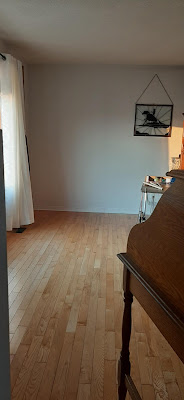I took on a project this summer to restore all my hardwood floors in my house. It's an exercise in patience and waiting long periods of time. The photo shows how I've had to push some of my furniture onto one side so that I can work on 1/2 the floor at a time. At the time of this photo, I'm waiting for the floor gloss to cure for 24hrs before I can move my furniture back.
What to do? What to do? I think I'll go riding in my back bush. The leaves are just starting to turn this fall and I have all those autumn landscape scenes. Times are a changin'.
Timing Your Horse Cues
I was watching some exhibitors at a reining show and over the course of the weekend I saw many things, but one thing I always see are a few exhibitors or horses start their stopping maneuver too soon. They rush their rundown - charge off like a bullet too quickly and miss their marker. They start their stop (:?) too quickly.
This sounds like it should be an easy thing to do - to know when to cue your horse for the rundown. Famous last words isn't it! 'If you been there - you know.' The timing seems to work in practise but when you're actually in the show pen, it's easy to get anxious to start to increase speed on the straight away. I haven't shown in years but I still remember how important it is to time the cue to have your horse increase their speed going to the sliding stop.
As many of the famous trainers like Bob Avila say: "Timing is Everything."
About Timing
Missing a marker is a 2 point penalty and in reining that usually makes a difference between being 'in the money' or not. "Gotta hate when that happens." It's always about timing and feel isn't it?
When I was watching this, I was reminded of a saying I used to tell my students. I would mention it when students got too quick with their hands. This would often rattle the horse causing a failure on what the horse/rider combo were doing. And the rider would get frustrated. I developed a saying to explain on how to time their cues better.
"A Little Sooner, Not Quicker"
If a rider were to plan their cues a little earlier and start cueing a little earlier then what they had previously been doing then the results were what they were looking for. There's also the problem of the horse deciding to take it upon themselves to increase the speed when they think it's the right time. That involves having to 'check' your horse with the reins if need be.
I believe learning how to time cues in the show pen or while riding in general helps with other areas of our life and visa versa.
Have a great fall everyone!
Putting My Spin on Timing.
Reinersue
@KISS Reiner


No comments:
Post a Comment